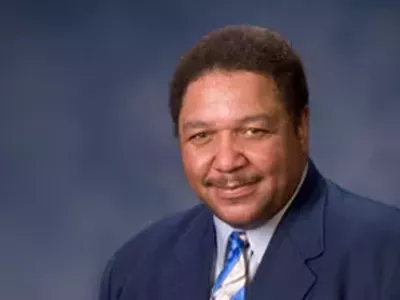As conspiracy theories go, this one is a doozy.
It involves the Canadian and U.S. federal governments — including the U.S. Coast Guard and the Department of Homeland Security — all of whom have allegedly joined forces in an attempt to either drive the privately owned Ambassador Bridge completely out of business or force billionaire owner Manuel "Matty" Moroun to sell half the span to the Canadian government.
The allegations are outlined in a lawsuit the Detroit International Bridge Co. and its subsidiary, the Canadian Transit Co., filed in federal court last week.
"The government of Canada has long wanted to take for itself the Canadian half of the Ambassador Bridge and the profitable toll-collection rights that go with it," the lawsuit states.
Lacking any "lawful means to accomplish that goal, the company alleges, the Canadian government worked with the U.S. Federal Highway Administration to bring down the bridge company." ALL ONE QUOTE?
They are doing so, in part, by pushing ahead to build the publicly funded Detroit River International Crossing downriver from the Ambassador, which is the busiest border crossing in North America, carrying about 25 percent of the commercial traffic between the U.S. and Canada.
According to the suit, the "FHA has unlawfully cooperated with, acted in concert with, aided and conspired with Canada in its scheme to undermine plaintiff's property rights."
The U.S. Coast Guard (which is part of the Department of Homeland Security) allegedly joined in this conspiracy by putting a halt to the bridge company's application to build a new span adjacent to the Ambassador. The Coast Guard, in taking that action earlier this year, stated that it was doing so because the bridge company, contrary to the USCG's regulations, was attempting to get its application approved without having first acquired all the land necessary to build the new bridge.
"The DIBC is in the process of acquiring the final parcel of land needed on the U.S. side," the company claims.
However, the parcel in question is a swath of Riverside Park two judges have said the company is illegally occupying and must vacate. The Bing administration has refused to say whether negotiations are under way. But even if the mayor's office is considering a deal, any proposed sale would have to be approved by the Detroit City Council. In addition, because of the way the parkland was originally acquired by the city, the state and federal governments would also have to sign off on the deal. That process could take three years or more.
The company, which has attempted to justify its occupation of the Riverside Park land by claiming it is doing so for national security purposes, dismisses the contention that a publicly owned Detroit River International Crossing planned downriver in the Delray area would provide a safeguard and keep commerce flowing in case the Ambassador is put out of commission by terrorists.
"Once the decision was made to site the new DRIC Bridge directly adjacent to the existing Ambassador Bridge," the company contends, "Canada's claim that the new bridge would produce 'physical redundancy' ceased to apply."
But unlike the bridge company's proposed span, which is indeed located "directly adjacent" to the Ambassador Bridge, the DRIC span is actually planned for a location about one mile downriver.
The lawsuit can only be seen as "disingenuous," says William Shreck, spokesman for the Michigan Department of Transportation.
As in the past, Shreck says that MDOT, which is not named in this lawsuit, is supportive of both a second span for the Ambassador and the DRIC Bridge, saying this area needs all the capacity it can get in order to remain competitive with other border crossings. He says, too, that a second bridge — not immediately adjacent to the Ambassador — is needed to prevent the potentially crushing financial blow that would result if the Ambassador were forced to shut down for even a short period.
The International Bridge Company, for which the Ambassador bridge generates a reported $60 million a year, is clearly worried about losing business to the DRIC crossing and is doing everything it can to keep that span from being built.
"We're playing with a ticking time bomb," says Shreck. "If anything happens at that [Ambassador] border crossing, the economy of Michigan shuts down. That's a risk we just can't afford to take."
"This isn't about the Detroit International Bridge Co.," adds Shreck. "This is about what's best for the public."
Curt Guyette is Metro Times news editor. Contact him at 313-202-804 or [email protected]





